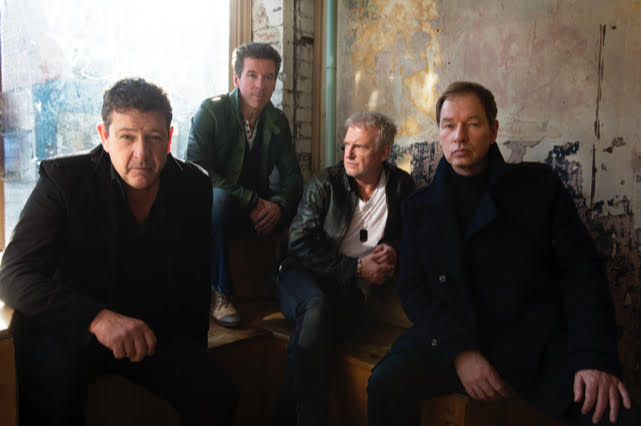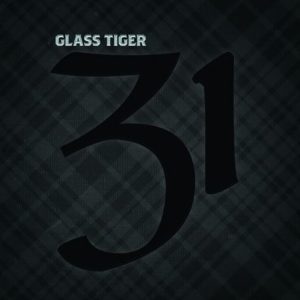
The new Glass Tiger album 31, is proof that something wonderful can come from something that was definitely not wonderful. The new record, which is an imaginative re-interpretation of many of the band’s biggest and best loved hits, is an emotionally compelling celebration of family, friends, comradeship, life and love.
It came about, to no small degree, because of the near-tragedy that struck the band in the summer of 2015 when vocalist/songwriter Alan Frew suffered a stroke. Such moments in life are often the crucibles through which ties of friendship and family grow stronger and one’s sense of themselves, their lives and careers become clear, refined and simplified.
 As Frew recovered, the band surged forth with the idea of possibly issuing some music to commemorate the 30th anniversary of the release of their first album Thin Red Line, which came out in 1986 and was an instant hit. But that plan took a remarkably unexpected and adventurous turn when a friend of the band, country music sensation Johnny Reid, approached Frew and bandmates Sam Reid (keyboards), Al Connelly (guitar), Wayne Parker (bass) and drummer Chris McNeill, with the idea of him taking the reins of this new project.
As Frew recovered, the band surged forth with the idea of possibly issuing some music to commemorate the 30th anniversary of the release of their first album Thin Red Line, which came out in 1986 and was an instant hit. But that plan took a remarkably unexpected and adventurous turn when a friend of the band, country music sensation Johnny Reid, approached Frew and bandmates Sam Reid (keyboards), Al Connelly (guitar), Wayne Parker (bass) and drummer Chris McNeill, with the idea of him taking the reins of this new project.
The result is a startlingly refreshing album that is far from being a rehash of former hits and certainly way more than a simple ‘greatest hits’ agglomeration.
“Johnny was doing an event out east and Alan and I were there, and he has been a fan of Glass Tiger’s since he immigrated to Canada from Scotland and he said he used to wear out his Thin Red Line record. And I remember he told Alan, ‘I think you dodged a major bullet and it really reminds you of what is important in life: friends, family, brotherhood, sisterhood and all that stuff.’ He said, ‘we should do something together and you should celebrate al that.’ We already had a bunch of new things in progress and it was Johnny who said ‘I love these tunes and they’re so different than what I would normally do, I would love to help you re-imagine these because if we’re talking about friends and friendship, these songs are really like old friends. Let’s just give them some new clothes,’” Sam Reid said, saying the band really had no interest in simply releasing another ‘best of’ collection.
“So that was the motivation behind this. Over the years, every time you take a break in this industry, the record labels, who are always constantly trying to keep generating revenue, they will often just pump out these greatest hits packages. Which is fine for then, it’s catalogue. Its not overly exciting for us or our fans because if you’re a fan of Glass Tiger you probably have them all, just because they may change the order of the songs – but it doesn’t mean they’re different. It’s just something the industry does, and we understand that, and we didn’t want to do that anyways. After talking with Johnny, we felt that if we’re going to do this, then let’s strip the songs back and rebuild them kind of.
“But honestly, we wouldn’t have done this on our own because we’re too close to it, but we trusted Johnny’s judgement. He said, ‘come down to my place in Nashville and let’s spend some time and let’s just pick a couple of tracks and see where it goes. If it goes nowhere, it will have been fun, and we will just move on. If we really like the way it’s going, we will add some songs to the list and keep going, which is what happened.”

Some of the reimagined songs have special guest performers. Julian Lennon sings on a haunting, stark version of Thin Red Line, while former Great Big Sea frontman Alan Doyle appears on My Song. French-Canadian chanteuse Veronic DicCaire offers up a beautiful rendition of Someday.
The title track from the second Glass Tiger album, 1988’s Diamond Sun, features portions sung in Inuktitut by Susan Aglukark along with some First Nations chanting by David Maracle.
“We were working under the overall idea of inclusiveness. We wanted to get people involved who we of course know, who we respect and who we feel would understand the message of the album. Julian Lennon was somebody who was kind of off the beaten path because he is doing mostly photography more so now than singing. But he has been a friend of ours since 1986 when we toured with him. Alan has stayed in touch with him here and there over the years and when Alan had his stroke, one of the first messages to come in to check on him was from Julian. We didn’t know what song he should do but we felt Alan should talk to Julian to see if he was interested because, obviously on the friendship end he would be great, and maybe a surprise for a lot of people because he hasn’t done a lot of music in recent years. We sent Julian a few of the revamped tracks and there was a hands-down winter, he emailed back and said, ‘it’s got to be Thin Red Line,” Reid explained.
“We have always had great fans in Quebec and we did this TV show in Montreal and Veronic was the special guest and she was a huge fan of the band. We were actually a surprise for her, so the curtain drops, and we walked out, and it was one of those ‘This is Your Life’ kind of things. It was cool getting to meet her. She has been on the road with Celine Dion and is an amazing singer and we just flat out asked her if she would maybe translate Someday into French and sing it. She said yes, and less than a week later she is in a studio in Toronto cutting the track.
“Diamond Sun, because of the video we did back in the day, has always had a very strong First Nations’ vibe. Susan is such a pleasant person and she’s got such a beautiful and calm, strong voice. We were label mates with her with Capitol and asked what she though about doing a First Nations’ version of Diamond Sun and she loved the idea and immediately translated the second verse. We also worked with David Maracle and he did the chant and some First Nations’ percussion instruments. It was fascinating to have the track transpire like that.”
The biggest surprises may come with the way Reid deconstructed some of Glass Tiger’s biggest hits, surprising even Reid in the process.
“Our normal process was sitting around Johnny’s kitchen table with acoustic instruments everywhere and just tearing the songs down to their essence and seeing how they felt to us just sitting around that table. And if something felt really good through the campfire test, then we proceeded. And I think most of the things we tried, we kept. As for the most radical alteration from what I had in my head, I would say Thin Red Line. When Johnny said, ‘I’ve got this idea for like one piano note and then just the voice,’ we were asking, well what happens to the guitar riff? He was like, ‘no guitar riff, just voice and piano – very emotional and solemn.’ And I remember saying, okay – that one was a shocker,” he said.
“And the other one that we morphed quite a bit was I Will Be There, which was surprising too. At one point in time Vince Gill was going to be guesting on that one, but then he went off and joined a silly little band called The Eagles, so we lost him. But he loved this new version of the track. We ended up with a Nashville session guy, but I thought it was kind of exciting because we have never had a pedal steel guitar on a Glass Tiger song before.”
As well, there is one new song, ‘Wae Yer Family’, which features Johnny Reid, as well as a scintillating cover of his hit song Fire It Up, which was co-written with Frew.
 Returning to the subject of Frew’s stroke and subsequent amazing recovery, Reid said, as you would with any friend or family member, Glass Tiger rallied around their fallen frontman, putting everything else on the back burner to support him.
Returning to the subject of Frew’s stroke and subsequent amazing recovery, Reid said, as you would with any friend or family member, Glass Tiger rallied around their fallen frontman, putting everything else on the back burner to support him.
“At the time we were heading into our 30th anniversary and were pretty gung ho. We were thinking about what tours we wanted to do and did we want to put out new music under the 30th banner. We had all these things in progress, and then when Alan had his stroke, we all decided that of course everything takes a back seat now to his health. We just decided that we would let him recover; we wouldn’t worry about trying to chase a 30th anniversary because, quite honestly, it’s just a number and it’s something that is probably more important to us than anyone else on this planet. But it’s not a number that we have to be in a huge panic over,” he said, adding that he won’t ever forget receiving the call from Frew himself regarding the stroke.
“I was at my studio working when the phone rang. When I answered the phone that I knew it was Alan right away, but I also realized that something wasn’t right because he had trouble speaking to me and then he managed to get the word ‘stroke’ out, and it just hit me like a ton of bricks. I dropped everything I was doing, and I just jumped in the car and drove to Toronto [from Newmarket, Ontario, where the band members grew up and where the earliest incarnations of Glass Tiger were formed] and went to see him.
“And on the drive down I am thinking all the sorts of things anyone is thinking when they hear about a friend or loved one having a stroke, and you start to jump ahead of yourself in your mind. But it was one of those things that once I got there and we found out a but more information, that he had some lingering conditions from the stoke, but it was going to be something he was going to be able to work hard and recover from. Then of course we were just wanting to support him in that, and we were all delighted that he in fact did dodge a bit of a bullet.”
The whole process of rallying around Frew while he recovered brought everyone involved closer together and the revitalization of the Glass Tiger hits for the 31 album, under the passionate leadership of Reid, truly became a labour of love for Frew, Reid, Connelly, Parker and McNeill.
“The stroke was a wakeup call for everyone, mostly Alan. But when you’re as close as we are in the band – and we have been together long enough that we sort of finish each other’s sentences – we are very much connected when we tour and play together, but also when we don’t. So, when something like this happens to one of us, it happens to all of us. We were very concerned, and it makes you sit back and think a little differently about what is important, which is the whole reason for this new record. If there is something that can come out of something negative, it’s that it brought us closer together,” Reid said.
“It got Johnny Reid into our lives on a deeper level and he has really helped us to focus on this reimagining process. He is very happy with the record, as are well and he sent a few messages to us saying, ‘I am delighted to have been a part of this re-establishment of you guys.’ We are very grateful for what we have and hopefully we can continue for a while longer.”
At present, Glass Tiger is on a 45-date, cross-Canada tour with Reid, not as an opening act, but as a special guest component of the show. Reid introduces the band and they come out and perform a short medley of hits in the style in which they were recorded for 31. The tour began in British Columbia on February 28 and runs through western Canada before arriving in Ontario for two shows at the Thunder Bay Auditorium on March 27 and 28. Concerts follow in Sault Ste. Marie, Sudbury, Toronto, Kitchener, Windsor, St. Catharines, London, Hamilton, Peterborough, Oshawa, Ottawa with the last date of the Ontario run April 14 at the Rogers K-Rock Centre in Kingston. The travelling road show heads east for performances in the Maritimes, wrapping up at the Mile One Centre in St. John’s. Newfoundland on April 24.
“And then after this tour, we are going to circle back into some of the same venues and do a full-on Glass Tiger concert. It will still be our standard rock show the way people are used to it, but we’re going to play around, if the venue suits it, and have some fun with the new versions. Some of the settings, like a big multi-act festival it wouldn’t be feasible to do, but for some venues where its more flexible, we will maybe bring in some Celtic artists and try some different things for a few songs.” Reid said.
For more information, visit www.glasstiger.ca.
- Jim Barber is a veteran award-winning journalist and author based in Napanee, ON, who has been writing about music and musicians for a quarter of a century. Besides his journalistic endeavours, he now works as a communications and marketing specialist. Contact him at jimbarberwritingservices@gmail.com.
SHARE THIS POST:
